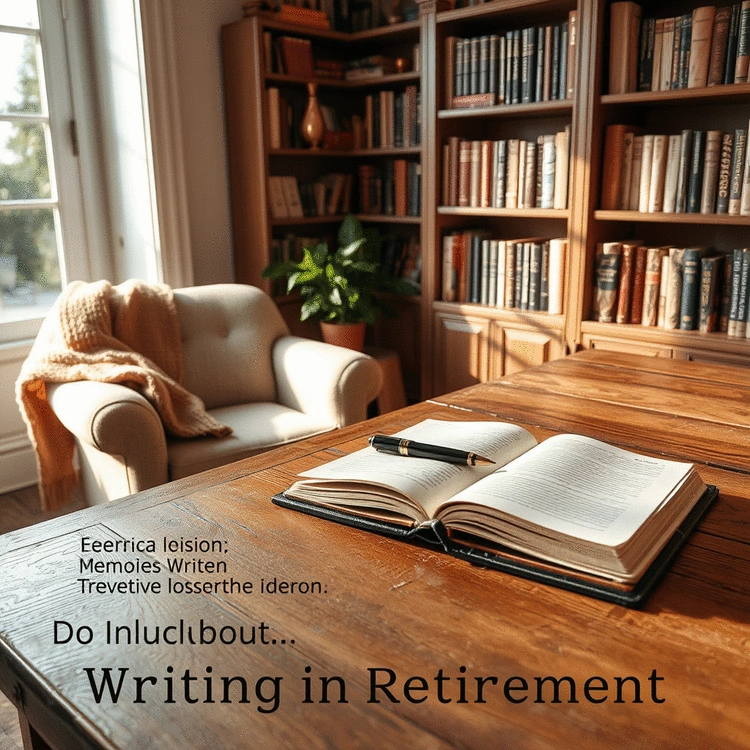
- Creative Writing
- Sep 09
2025-10-18
Writing a memoir can be a transformative experience, especially during retirement, as it allows individuals to reflect on their life journeys and share their unique stories. Each memory holds the potential to inspire others, creating a legacy that transcends generations.
Understanding the distinctions between memoirs and autobiographies can enhance your writing journey. Below are the core differences represented visually. If you're interested in exploring other forms of creative writing, consider how memoir writing can serve as a foundation for starting your first novel.
Focuses on specific themes or events, exploring personal reflections and emotions.
Provides a chronological account of your entire life.
Provides a clear, straightforward structure.
Offers depth and focuses on interconnected experiences.
Memoir writing is a beautiful way to reflect on your life's journey, especially during retirement. It's not just about recording events; it’s about sharing experiences that shaped who you are. As I guide retirees through their writing adventures at Retirement Writers Retreat, I often see how this process can become a powerful tool for self-discovery and connection.
Many retirees have a wealth of memories and stories to share. By embracing memoir writing, you open a door to understanding your past while creating a legacy for future generations. Each story holds the potential to inspire others, making it a meaningful endeavor.
While memoir and autobiography may seem similar, they serve distinct purposes. An autobiography usually covers your entire life chronologically, while a memoir focuses on specific moments or themes. This thematic approach allows you to delve deeper into particular experiences and emotions, making your writing more engaging.
Understanding these differences is essential as you embark on your writing journey. At the Retirement Writers Retreat, we emphasize the power of memoir to connect with readers on a personal level. Your unique voice and perspective can offer valuable insights that resonate with others, much like the joy in writing discovered by many retirees!
Themes and emotions are the heart of any memoir. They help readers connect with your story on a deeper level. Consider what moments in your life have significantly impacted you—these can serve as the backbone of your memoir.
By exploring these themes, you can create a narrative that not only shares your experiences but also invites readers to reflect on their own lives. Stories have the power to evoke feelings and foster understanding, which is precisely what we encourage at the Retirement Writers Retreat.
When crafting your memoir, you have two primary options: a chronological narrative or a thematic one. A chronological approach follows a linear timeline, making it easy for readers to follow your life story. In contrast, a thematic narrative allows for more flexibility, helping you focus on specific themes that resonate with your experiences.
Here are the benefits of each approach:
Choosing the right structure for your memoir depends on the story you want to tell. Remember, whichever route you take, your goal is to connect with your audience and share your journey authentically.
Writing a memoir can be a fulfilling endeavor during retirement. It’s a chance to reflect on your life, to understand your journey, and to share your unique perspective with others. Each moment captured in your writing contributes to the legacy you leave behind.
At the Retirement Writers Retreat, I’ve witnessed how writing can bring a sense of purpose and direction. Retirees often find that this creative outlet not only helps them process their experiences but also fosters connections with others who relate to their stories.
Engaging in memoir writing can lead you to profound insights about your life. It encourages reflection on experiences that have shaped you. Through this process, many retirees discover newfound clarity and purpose!
Writing serves as a mirror reflecting your life’s journey, allowing you to appreciate how far you’ve come. As you share your story, you not only acknowledge your past but also inspire others to do the same.
It's never too late to tap into your creative side! Many retirees find that this stage of life is the perfect time to explore their creativity. Memoir writing can be a transformative journey—one that leads to self-discovery and personal growth.
During our workshops at the Retirement Writers Retreat, I encourage retirees to embrace their stories, no matter how ordinary they may seem. Every experience contributes to the rich tapestry of your life!
As you embark on this journey, remember that your voice matters, and your stories deserve to be shared. Writing can be a liberating experience that opens doors to new perspectives and relationships. For more inspiration, explore stories of retirement reimagined through the power of story.
Effective writing techniques can enhance your memoir and bring your stories to life. As you begin, consider incorporating various methods to spark your creativity and shape your narrative.
One of the most powerful tools you can use is writing prompts. These prompts can help you explore different aspects of your life and inspire new ideas. At the Retirement Writers Retreat, we love to share prompts that get the creative juices flowing!
Writing prompts can serve as a launching pad for your memoir. Here are a few to consider:
Using these prompts, you can dive deeper into your memories and discover stories that may have been hidden away. Embrace the process—it’s all about exploration and expression!
Your personal narrative is what makes your memoir unique. It’s essential to find your voice and let it shine through your writing. Consider how your experiences shape your perspective and how you want to express that to your readers.
Here are a few tips for infusing your voice into your memoir:
Finding and embracing your voice is key to crafting a compelling memoir. The stories you share can be incredibly powerful, connecting with others and leaving a lasting impact.
As we continue our exploration of memoir writing, here’s a brief recap of the key points discussed so far:
Once you've poured your heart and soul into writing your memoir, the next exciting step is sharing it with the world! Publishing can seem daunting, but understanding your options makes it easier. Whether you're leaning towards self-publishing or traditional routes, it’s essential to know what each entails so you can make the best choice for your unique story.
At Retirement Writers Retreat, we often encourage retirees to embrace the self-publishing journey. It allows you to maintain control over your work and get it into the hands of readers on your terms. Let’s explore some steps and considerations for getting your memoir published!
First things first: you’ll want to familiarize yourself with the self-publishing landscape. It’s a great option for those of us who want to share our stories without the long wait that traditional publishing can involve. Here are some steps to consider:
Self-publishing is incredibly empowering, allowing you to express your voice on your terms. Also, be sure to craft a memoir book proposal if you're considering reaching out to literary agents. This can be a vital tool in showcasing your work to potential publishers.
As a retiree, you bring a wealth of life experience and stories to your memoir. The self-publishing landscape is welcoming and gives you the freedom to share your unique voice. It’s not just about getting published; it’s about connecting with readers who resonate with your journey.
Here are a few important aspects to consider as you navigate the self-publishing world:
For more strategies on sharing your work effectively, check out our insights on publishing your retirement stories.
Finding support is crucial on your writing journey. There are numerous resources available, both locally and online, that can provide encouragement and enhance your writing skills. Connecting with other writers can be a source of inspiration and camaraderie!
Consider these valuable resources:
Workshops provide a nurturing environment where you can share your stories and learn from others. Participating in workshops specifically designed for retirees can be especially beneficial, as they cater to your unique experiences and perspectives.
Remember, the writing community is vast and welcoming! Embrace the chance to connect with fellow writers who understand the journey you’re on. They can offer insights and encouragement that make the writing process even more enjoyable.
Now that you have the tools and resources at your fingertips, it’s time to dive into your memoir journey! Overcoming any initial hesitations is key. Remember, your stories matter—each one is a thread in the beautiful tapestry of life experiences that can inspire others.
As a member of the Retirement Writers Retreat community, you’re not alone. We celebrate the journeys of retirees just like you, encouraging each other to share our unique stories. Let’s take this leap together!
It’s common to feel hesitant when starting something new, especially writing a memoir. However, keep in mind that your life experiences are valuable! Here are some motivating thoughts to help you get started:
Let’s celebrate the stories that make us who we are! Embrace your creativity and begin writing your memoir with confidence.
Once you’ve committed to your memoir journey, it’s time to set practical goals. Here are some steps to guide your writing process:
Every step you take brings you closer to crafting a memoir that reflects your journey. So, let’s pick up those pens and create something beautiful together! Your story is waiting to be told. For additional tips on maintaining your writing momentum and finding community, consider exploring how to write creatively after retirement.
Here is a quick recap of the important points discussed in the article:
